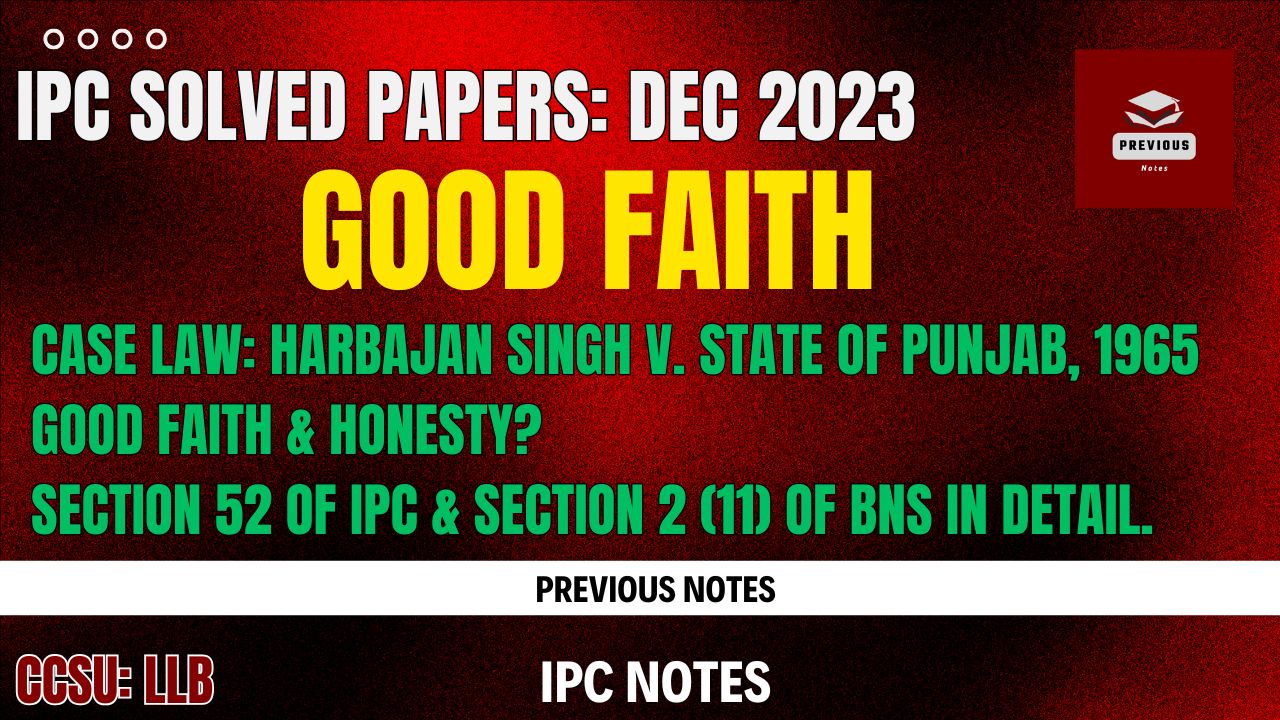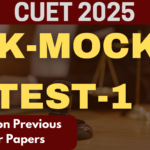Good faith in BNS and in IPC- Topics Covered
Topics Covered:
- Good Faith Definition (As per General Clause, BNS)
- Good faith & Honesty ?
- Elements of Good Faith
- Case Law
- Good faith as a defence
Good Faith Definitions:
- Section 52 of IPC: Nothing is said to be done or believed in “good faith” which is done or believed without due care and attention.
- Section 3(22) of the General Clauses Act, 1897, “good faith” refers to an act done honestly, whether or not it is done negligently. The focus is on the intention, not the outcome.
- BNS: Section 2(11) “good faith”.—Nothing is said to be done or believed in “good faith” which is done or believed without due care and attention;
Good Faith and Honesty:
Honesty
- Definition: Honesty is primarily about being truthful, transparent, and free from deceit or falsehood. It reflects a person’s integrity and commitment to truth in their words and actions.
- Focus: Honesty is fact-centric; it revolves around whether the information or claims a person makes are accurate and whether they are avoiding intentional misrepresentation.
- Limitations: Honesty, on its own, does not necessarily consider the effort to ensure accuracy or the broader context. A person may genuinely believe something to be true and honestly represent it but fail to verify its validity.
Good Faith
- Definition: Good faith extends beyond honesty to encompass sincere intent, conscientious effort, and adherence to fairness and reasonableness in dealings.
- Focus: Good faith is motive- and conduct-centric. It assesses whether a person genuinely intends to act fairly and responsibly, even if unintended errors occur.
- Due Care: Good faith requires not only sincerity but also diligence—the effort to gather facts, verify information, and act responsibly. Without reasonable effort to validate one’s position or actions, a claim of good faith may not hold up.
- Honesty is essential for good faith, but good faith also requires due care and diligence.
- Mere honesty without reasonable effort to verify facts does not constitute good faith.
- Honesty focuses on truthfulness and avoiding deceit, while good faith emphasizes sincere intent, even if mistakes or negligence occur. Honesty is about facts; good faith is about motives.
- ‘Good faith’ precludes pretence or deceit and also negligence and recklessness.
- “Good faith therefore implies, not only an upright mental attitude and clear conscience of a person, but also the doing of an act showing that ordinary prudence has been exercised according to the standards of a reasonable person.
Key Difference:
Key Differences
Scope:
- Honesty is narrower, focusing on truthfulness in communication.
- Good faith is broader, covering intent, effort, and fairness.
Responsibility:
- Honesty relies on a person’s existing knowledge; no explicit duty to investigate facts is implied.
- Good faith requires proactive responsibility, such as verifying facts and considering potential consequences.
Judgment Basis:
- Honesty is judged on whether the statements or actions align with known facts.
- Good faith considers the motives, sincerity, and diligence behind the actions.
Harbajan Singh v. State of Punjab, 1965 SCR 235 (243)
Fact:
- Harbajan Singh published invovlment of then Pujab CM’s son in smuggling and other activities.
- The statement was published in the ‘Tribune’ on 25th of July, 1957.
- CM & his son went to Cout accussing him of Defamation charges under section 499,500 of IPC.
- He tried by the Additional Sessions Judge, Delhi who found him guilty and sentenced him to one year’s simple imprisonment by his order dated 27th. of August, 1959.
- He preferred appeal from his conviction in High Court first.
- High Court reduced his sentence to three months as he was unable to prove that he made the statement in good faith.
- High Court said though the statement was published in public good but veracity of the facts needed to be checked.
- Then he moved to SC.
High Court Observations:
This decision brings out four principles:
- Firstly, that “good faith” means good faith and also the exercise of due care and attention;
- Secondly, that due care and attention means that the libeller should show that he had taken particular steps to investigate the truth and had satisfied himself from his enquiry, as a reasonable man, that he had come to a true conclusion;
- Thirdly, that the conduct of the accused, during the course of the proceedings in a Court, is a relevant factor in determining his good faith; and
- Fourthly, that if there are several imputations, good faith or truth must be proved with respect to every imputation, and, if he fails in substantiating truth or good faith in respect of any one imputation, conviction must stand.
Supreme Court:
The main issue that was involved was whether the statement was made in good faith or not.
SC observed that, may other politicians were demanded independent inquiry against then CM’s son. The statement was published by other news paper as well.
SC concluded that the statement was made in good faith and sentence passed against him was set aside.
Good Faith as a defence
- Section 499
- Section 339
- Exception 3, Section 300
- Section 93 (Communication in good faith)
- Section 78, 88,79
You may also like:
You May Also Like:
Crimes without Mens Rea? Statute without Mens Rea.
IMPOSSIBLE ATTEMPT | ATTEMPT VS IMPOSSIBLE ATTEMPT
Mistake of Fact Vs. Mistake of Law | Sec. 76 of IPC
Movable Property in IPC: IPC Section 22
Wrongful Gain and Wrongful Loss in BNS & in IPC
Nature, Scope, Importance of Jurisprudence
Definition of Jurisprudence by various jurists
Relationship between Law and Morals
Difference between Austin and Kelson
Realist Movement of Jurisprudence
Jurisprudence is lawyers’ extraversion
Short note on ‘Manu’ : Jurisprudence
Short Note on Jeremy Bentham: Jurisprudence
Short note on ‘Sir John Salmond’ Jurisprudence
Euthanasia in India, Right to die with Dignity
Right to Privacy Case Law Mr. X vs. Hospital Z
Federal Constitution Definition and key points
University of Madras vs. Shantabai,1954: Article 12 Case Law
Article 20 Fundamental Right with Case Laws
Article 19 Fundamental Right of Indian Constitution with 10 Case Laws
Article 358, 359 Fundamental rights during emergency
Parliamentary Privileges and Fundamental Rights with Case Laws
Article 14 Fundamental Right with Case Laws
Article 15 Fundamental Right with Case Laws
Article 12 Fundamental Right with Case Laws
DOMESTIC VIOLENCE AS TORT | APPLICATION OF TORT LAW
Crimes without Mens Rea? Statute without Mens Rea.
Definition of crime by various jurists, Criminology
Methods of Studying Criminology
All about Capital Punishment with Case Laws
IMPOSSIBLE ATTEMPT | ATTEMPT VS IMPOSSIBLE ATTEMPT
Difference between Preparation and Attempt
Tests to Determine Attempt and preparation | With Case Laws
Difference between intention and motive | In Tabular Format
Forms of Judicial Process: Adversarial & Inquisitorial
Indian Penal Code MCQs Quiz: Section 1 to 5
Indian Panel Code MCQs Quiz on Section 511 and Attempt
IPC MCQs Quiz on Sec. 76 and Sec. 79 | Quiz on Mistake
Practice IPC MCQs online for free (Section 78)
Practice IPC MCQs Quiz for free | Section 81 MCQs | Necessity
Practice IPC MCQs online for free : Infancy (section 82-83)
Practice IPC MCQs Quiz for free | Section 81 MCQs | Necessity
Practice IPC MCQs Quiz for free | Section 84 MCQs | Insanity
Practice IPC MCQs Quiz for free | IPC Section 85 MCQs | Intoxication
Difference between tort and crime | Previous Notes
DOMESTIC VIOLENCE AS TORT | APPLICATION OF TORT LAW
Economic Tort | Business Tort: Application of Tort Law
Difference between intention and motive | In Tabular Format
Bolam Test | Bolam V. Friern Hospital Committee | Medical Negligence
Jacob Mathew V. State of Punjab Case Law | Medical Negligence
Medical Negligence in tort | Case Laws
Contributory Negligence | Law of Tort | Case Laws
Essential conditions of liability for negligence | Negligence in torts
Specific Principles of Criminal Law | LLM Previous Year Paper 2024 | CCSU
Specific Torts | LLM 4th Semester Previous Year Paper 2024 | CCSU
History and Basic Principles of Criminal Law | Previous Paper 2023
LLM Previous Year Paper 2023 | PRIVILEGED CLASS DEVIANCE
PENOLOGY PREVIOUS YEAR PAPER | LLM | CCSU
LL.M Previous Year Paper 2023: Legal Education & Research Methodology
LL.M Previous Year Paper 2023: Jurisprudence-I Download Now!
LL.M Previous Year Paper 2023: Indian Constitution! Download Now!
LLB Previous Year Paper 2023 | Constitutional Law II | CCSU
LLB Previous Year Paper 2023 | Legal and Constitutional History | CCSU
LLB Previous Year Paper 2023 | Jurisprudence II | CCSU


















Leave a Reply